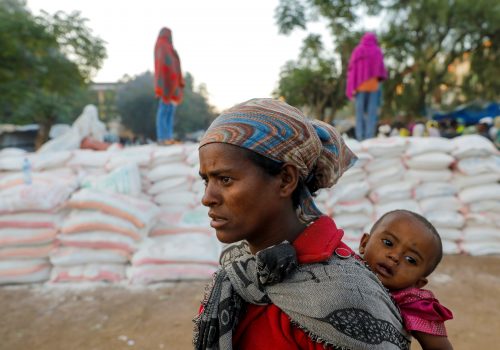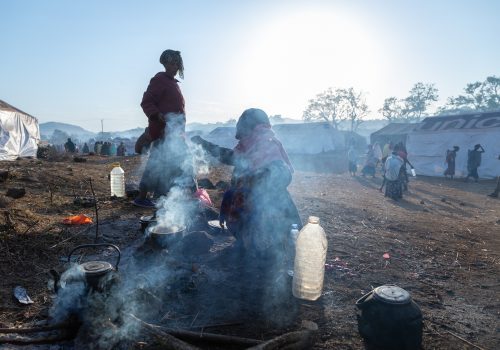FAST THINKING: Ethiopia is on the brink
GET UP TO SPEED
The tide is turning quickly. Northern rebels are rapidly advancing on Ethiopia’s capital, Addis Ababa, as Prime Minister Abiy Ahmed declares a state of emergency and issues a call to arms for regular citizens. The reversal in the country’s brutal year-long war comes as the United States is moving to revoke Ethiopia’s trade privileges because of the government’s human-rights violations in the Tigray region, detailed in a new United Nations report. What moves does Abiy have left? What role is US policy playing? What other dominos may fall in the region? Our experts keep you ahead of the curve on this fast-moving story.
TODAY’S EXPERT REACTION COURTESY OF
- Cameron Hudson (@_hudsonc): Nonresident senior fellow at the Africa Center and former director of African affairs at the National Security Council
- Aubrey Hruby (@aubreyhruby): Nonresident senior fellow at the Africa Center and investor in African start-ups
On the march
- Originally involving limited strikes against Tigrayan separatist leaders, Abiy’s war has since spiraled out of control—with Ethiopia now facing potentially tragic consequences. “State-sponsored genocide and even state collapse remain frighteningly real scenarios,” Cameron tells us.
- Abiy, the 2019 Nobel Peace Prize-winner, appears to have overplayed his hand by underestimating his opponents, who have traditionally been among the Ethiopian army’s best fighters and tacticians. “The government has slowly seen its overwhelming strategic advantage eroded against a rump force more adept at insurgency combat and clearly more motivated by a fight for its literal survival,” Cameron adds.
- Meanwhile, a government blockade of the Tigray region has left nearly one million civilians in danger of famine as the conflict has expanded to neighboring regions—as “hateful and dehumanizing speech” villainizing Tigrayans more broadly suggests that Abiy and his loyalists may be “inciting genocide as part of [their] last-ditch defense effort,” Cameron believes. Case in point is Abiy’s speech today, in which he declared: “We will bury this enemy with our blood and bones and make the glory of Ethiopia high again.”
Subscribe to Fast Thinking email alerts
Sign up to receive rapid insight in your inbox from Atlantic Council experts on global events as they unfold.

Sullied success story
- That’s all the more tragic considering Ethiopia has been one of the world’s fastest-growing economies, Aubrey notes, averaging nearly 10 percent growth per year for the past decade. But the war’s crippling effect on the economy has led to soaring food prices while “scarce foreign exchange has halted production and curtailed access to basic imported goods,” she adds. The National Bank of Ethiopia ordered the suspension of commercial lending, drying up credit and choking off investment.
- In response to Abiy’s offensive, the United States slapped sanctions on his government in September and this week moved to terminate duty- and quota-free access to the US market as part of the African Growth and Opportunity Act (AGOA). Aubrey believes that while the trade restrictions probably won’t compel Abiy to end the fighting, they “will likely result in the loss of around two hundred thousand direct jobs, mainly for women working in factories, and a million or so additional jobs servicing export-oriented factories—another cause of suffering for everyday Ethiopians.”
- At this point, Cameron adds, any US effort to bring about a ceasefire through the threat of additional sanctions “rings hollow in what has emerged as an existential battle for survival for both sides.”
- And the “dire economic consequences” of the violence won’t stop at Ethiopia’s borders, Aubrey warns, with the recent military takeovers in Guinea and Sudan combining to spook investors: “The already-skewed perception of risk in African markets will sadly only intensify.”
A new geopolitical order
- A year ago, Abiy appeared to be aiming for a swift and limited “blitzkrieg” in Tigray, Rama tells us. But “from day one, it has been a regional war,” drawing in neighboring Eritrea and sending tens of thousands of refugees spilling across borders.
- The outcome is all the more jarring, Rama says, because Ethiopia has long been a “hub of stability in a volatile area” afflicted by conflicts in the Sudans, Somalia, and Eritrea. Now that Ethiopia has become the main source of instability in the Horn of Africa, she expects to see a broader “blast effect.”
- Zooming further out, Rama points to how rampant instability in the region has created an opening for outside influence beyond traditional players like the United States and European powers. These new influencers, she says, include Turkey, Saudi Arabia, Qatar, the United Arab Emirates, Russia, Israel, and China, which is heavily invested in a railroad linking Addis Ababa to the sea via its Belt and Road Initiative.
- “What the increasingly noisy presence of these (re)emerging regional powers reveals is not a simple destabilization,” Rama tells us, “but a new global geopolitical order” with a focus on Africa.
Further reading
Thu, Oct 7, 2021
Time is running out for Abiy’s ‘new beginning’ in Ethiopia
New Atlanticist By
Cheering crowds and soaring rhetoric cannot hide the fact that Prime Minister Abiy Ahmed’s troubles run deeper than just one restive region.
Fri, Sep 17, 2021
Biden finally gets bold on Ethiopia. But will it bring peace?
New Atlanticist By
The Biden team has launched its final and most elaborate warning shot before cracking down with sanctions against human-rights abusers in the Tigray region.
Wed, Mar 3, 2021
The unintended consequence of Ethiopia’s civil war might be a border war with Sudan
AfricaSource By
Ethiopia is at war with itself—and the international community is struggling to respond. The stakes in Tigray are high and the civilian toll could be considerable. But there’s another scenario, with the potential to exact an even higher toll, that many observers are overlooking: conventional war that could break out at any moment between Sudan and Ethiopia and their many allied proxies.
Image: FILE PHOTO: Members of Amhara region militias ride on their truck as they head to face the Tigray People's Liberation Front (TPLF), in Sanja, Amhara region near a border with Tigray, Ethiopia November 9, 2020. REUTERS/Tiksa Negeri/File Photo


